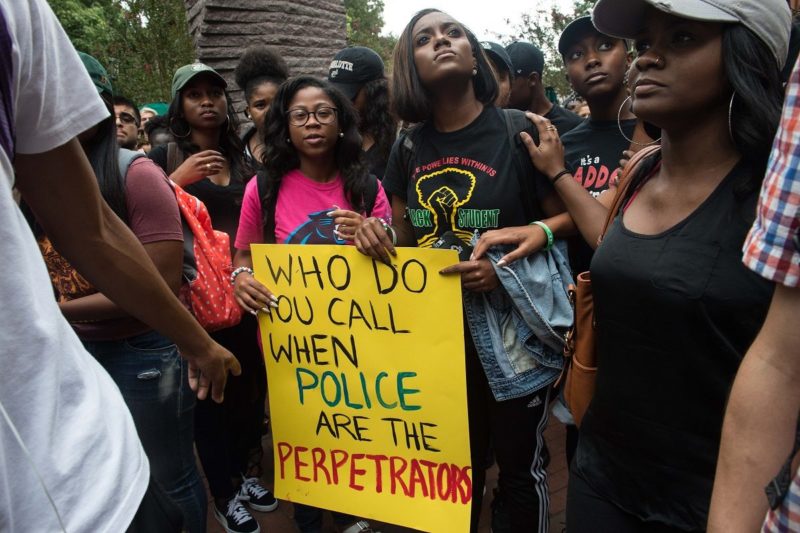Congressional Republicans: Shield Police From Legal Repercussions
“With the passage of this bill, every community with a police force will become potential collateral damage for a vision of America painted by racists,” said Ashley Yates, a Black Lives Matter organizer.

Civil rights advocates fear the Back the Blue Act brought by Republicans in the U.S. House and Senate will further criminalize communities of color as it aims to protect police officers against almost any civil liability or crime.
Senate majority whip John Cornyn (R-TX), Sen. Ted Cruz (R-TX) and Sen. Thom Tillis (R-NC) introduced the Back the Blue Act of 2017 (SB 1134/HR 2437) in mid-May. First introduced last year as a response to the fatal shootings of five officers at a Black Lives Matter rally in Dallas and three officers in Baton Rouge last July, the bill died in Congress.
The bill creates new federal crimes for assaulting or killing federally funded law enforcement, implements a mandatory minimum sentence, and makes it more difficult for police to be sued or for victims to be represented by attorneys, John Raphling, senior criminal justice researcher at Human Rights Watch, told Rewire.
The GOP-backed measure weakens a key rights protection statute, Section 1983 of the U.S. Code, by limiting the ability of victims of unjustified police violence to receive compensation for harm.
“My big concern is that it will be used to push out protests and make that a federal crime. At a time when there are widespread protests and arrests, adding mandatory minimum sentences is absurd,” said Raphling, who has called on Congress to reject the bill.
The bill would make killing a federal judge, federal law enforcement officer, or “federally funded public safety officer” punishable by a minimum of 30 years in prison. Attempts to kill would carry a ten-year minimum, and assault of an officer resulting in bodily injury, even a scratch, a two-year minimum.
Raphling painted a scenario: If someone is in a stolen car, or is a marijuana dealer, and an officer puts a bullet through his head, the officer would only be liable for funeral expenses.
“That’s crazy,” he said. “There is a real likelihood that they will use this selectively against political activists. Trump has made it very clear that he wants to silence them. This gives them a vehicle.”
While proponents of the bill claim it expands officers’ self defense and Second Amendment rights and creates new criminal protections for them, data indicate that the number of people killed by police are much higher than law enforcement deaths in recent times.
In 2015 and 2016, there were 137 and 143 police killed, respectively, according to the National Law Enforcement Officers Memorial Fund. In comparison, 1,092 and 1,146 people were shot and killed by police in 2016 and 2015, respectively, according to the Guardian’s database, The Counted.
“This is an incredibly dangerous and unnecessary bill that furthers the incorrect perception that law enforcement is under attack from the general population they are supposed to serve and protect,” said Ashley Yates, an early on-the-ground organizer in Ferguson, Missouri, and a Black Lives Matter organizer. “These attempts to afford excessive protections based on a particular job are beyond salt in the wound—they are coordinated steps towards disempowering dissent through deadly violence.”
From the Black Lives Matter and the Dakota Access Pipeline protests to resistance marches across the nation, protesters have already faced backlash from GOP legislators in the form of Blue Lives Matter bills and legislation criminalizing protests.
“This bill is also yet another display of this administration’s willingness to abuse and violently manipulate the powers of the office of president and federal government in order to fulfill their current agenda of steroidal militarization, disaster capitalism and privatization of basic resources. Anyone that believes in the individual freedoms that humanity affords us at birth should oppose this bill with vigorous and unprecedented opposition, including elected officials,” Yates said in an email.
Others worry that the proposed bill aims to attack rather than protect communities police serve and will further strain tenuous police-community relations.
Chris Burbank, a former police chief and director of law enforcement engagement at the Center for Policing Equity, told Rewire he fears the bill would do the exact opposite of what proponents claim: protect police, deter crime, and build police-community relations.
“It is a very comprehensive bill that pushes extra punishment in crimes against police officers,” he said. “We need to have equal and fair treatment for all people. Why are we creating disparity in law enforcement?”
Policymakers in the United States are already too focused on punishment, even as it’s been proven that more punishment and incarceration does not deter or lessen crime, Burbank said. Alternatives like education and treatment programs work much better, he said.
A bill that shields police officers from accountability would create further mistrust of law enforcement in communities of color that are disproportionately targeted and criminalized by a the criminal justice system.
Nearly 1 million of the total 2.3 million people incarcerated in the United States are Black. They are incarcerated at nearly six times the rate of their white counterparts. Moreover, in 2008, 58 percent of all prisoners were Black or Hispanic, even though they made up only about a quarter of the U.S. population, according to the NAACP.
Republicans’ Back The Blue Act “divides us more than it brings us together,” Burbank said. “The goal of a police department should be how are we going to prevent crime, not how we are going to punish and prosecute.”
Yates said it is imperative that this federal bill and state-level Blue Lives Matter bills do not pass because they are symbols of the GOP’s vicious backlash against civil rights movements.
“With the passage of this bill, every community with a police force will become potential collateral damage for a vision of America painted by racists,” she said.
